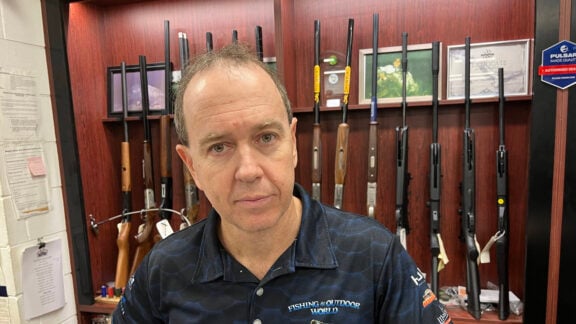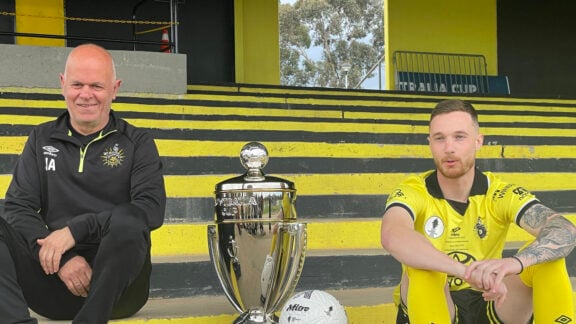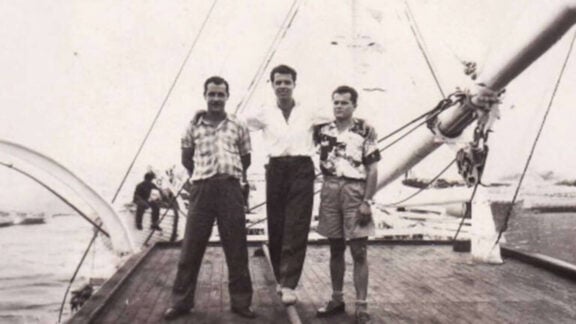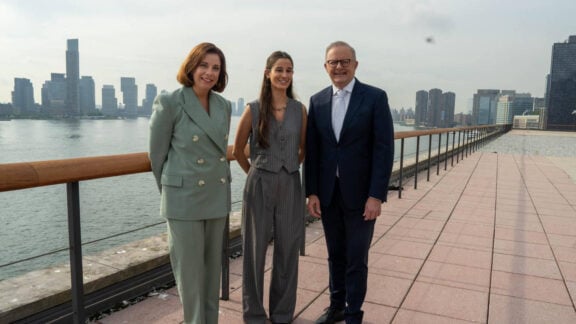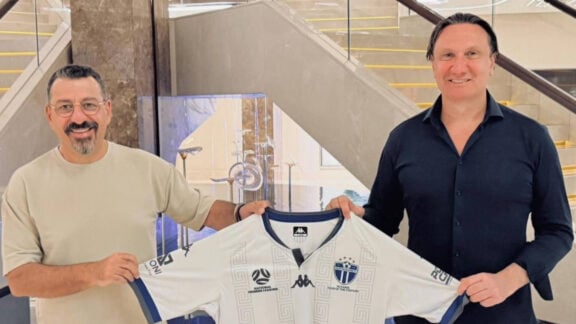Pfizer’s CEO Albert Bourla launched the Greek edition of his book describing Pfizer’s race to develop the first COVID-19 vaccine.
The book, titled ‘Moonshot: Inside Pfizer’s Nine-Month Race to Make the Impossible Possible’ gives a first-hand, behind-the-scenes account of how the pharmaceutical giant created the vaccine in only nine months.
Mr Bourla chose his hometown of Thessaloniki for the launch of the Greek edition, with Greek Prime Minister Kyriakos Mitsotakis in attendance to help him launch the book.
“The book describes how we overcame a global health crisis,” said Mr Mitsotakis, adding that “it shows that even the most complex and difficult obstacles are overcome with faith in certain principles, by operating truthfully, with stability and efficiency, with a plan, in a spirit of cooperation, and ultimately within a context defined by solidarity and joint effort, persevering through difficulties”.
“These fascinating adventures of the author himself essentially describe the example of the timeless and resourceful Ulysses, the one who always turns trials into successes, who travels everywhere but has his eyes fixed on Ithaca. In the case of Albert, Ithaca is Thessaloniki,” the PM said.
Mr Mitsotakis said that the CEO is “a true Greek at heart”, highlighting the fact that it was through Mr Bourla’s efforts that “Pfizer’s Digital Innovation Centre is based in the city of Thessaloniki, which employs almost 700 Greeks, many of whom returned to their home city from abroad”.
Finally, a special mention was made on Mr Bourla’s harrowing family story during the Nazi occupation of Thessaloniki. The Pfizer CEO described how if it hadn’t been for his mother and father hiding and escaping execution at the last minute, he wouldn’t be here today.
The Prime Minister said that the book is reminiscent of something from a detective novel, “specifically in a case experienced by the whole planet, the secret struggle of a group of dedicated executives to first decipher the mystery of the pandemic and then face it.. And as any good novel does, so it illuminates many aspects, from consultations with political leaders around the world, to the author’s lonely moments, those that interrupt only a few family moments and of course many thoughts about his roots, I will return to it in a little while. Leading, of course, the story of the extermination of the Jewish community of Thessaloniki in the Holocaust, the adventurous rescue of his parents and the new life they built after this unprecedented disaster”.
Read Mr Mitsotakis’ speech below:
Thank you very much Mr. Papachela, dear Albert, Mrs. Bourla, Ministers, Ladies and Gentlemen, I have gladly accepted the invitation to be present today at the presentation of the Greek translation of Albert’s book and to share with you some brief thoughts.
I am also glad to see in the audience all those who had a significant national participation in the great effort of organizing Operation “Freedom”, which enabled Greek citizens to have access to coronavirus vaccines. The first and most important is the Pfizer vaccine, the story of which Albert describes in a brilliant way in his book.
Closing these almost 300 pages of Albert’s book, two – I think – emotions envelop the reader: satisfaction on the one hand and a great sense of relief on the other. Because on the one hand he finds that this dizzying race to create the vaccine fortunately had a happy ending, while on the other he feels that all these successive battles fought by scientists with the coronavirus, for many months, were finally worth it. From the laboratories to the production units, finally man, science, overcame danger, overcame fear.
And if one wanted to classify Albert’s writing as a specific genre – I even told him as we entered the room – one would probably be embarrassed, because it is a chronology from the point of view of personal testimony. At the same time, it is reminiscent of something from a detective novel, in particular in a case experienced by the whole planet, the secret struggle of a group of dedicated executives to first decipher the mystery of the pandemic and then deal with a deadly virus as quickly as possible.
And as any good novel does, so it illuminates many aspects, from consultations with political leaders around the world, to the author’s lonely moments, those that interrupt only a few family moments and of course many thoughts about his roots, I will return to it in a little while. Leading, of course, the story of the extermination of the Jewish community of Thessaloniki in the Holocaust, the adventurous rescue of his parents and the new life they built after this unprecedented disaster.
However, I will avoid any reproduction of the very lines of the book, not so much because I would reveal details that are worth discovering by reading the book yourself, but because I would have wronged them. Albert writes in a very simple way. It is very clear that the book was written by him, not written by someone else on his behalf as often happens in these cases.
It has a very sharp style but also very comprehensive. It makes accessible to the ordinary reader the complex technical aspects of this endeavor, while not hiding the complex political rivalries that from the beginning besieged the discovery of the vaccine, especially in the phase of its availability, where I remind you that the European Commission, after consultations by Albert under its leadership, took the very bold, courageous decision to buy the vaccine as a whole as the European Union and to distribute it to all member countries based solely on their size, thus not distinguishing rich from poor countries, large from small countries . This decision was a great European success, which is also highlighted through the pages of Albert.
He is very direct in his writing and reading the book I lived again many of the anxieties and hopes. Besides, during the pandemic we communicated regularly. He always had the time to respond immediately to my messages and try to enlighten me, first about the progress of the vaccine discovery process and then, obviously, about how it was made available.
And I can testify to his constant, double devotion: on the one hand to science, on the other to entrepreneurship, to his cosmopolitanism but also to his patriotism, to his family, but also to his associates.
I make special mention of his collaborators because they are constantly mentioned by Albert throughout the book. They turn into a solid “canvas” that runs through all the chapters and the reminders of those who helped – whom we did not know – but have helped invisibly to this success, are repeated. I think this also conveys Albert’s view of what a good management model means, not only because teamwork is the secret to success at any level, but because courtesy and recognition are a prerequisite for any team to work well. Such elements rarely go away on their own, they are almost always accompanied by the leader’s self-confidence, open-mindedness, insight and social consistency.
And all this, of course, colors the path of our compatriot. He studied the paths of research to later serve as an effective manager. He then claimed his dreams across borders, always in a health-focused field. And he managed, starting from Thessaloniki, to become CEO of one of the largest pharmaceutical companies in the world, which obviously chose him with absolutely meritocratic criteria and I am sure that the Board of Directors of the company feels completely justified in his choice.
But at the same time, what I found very interesting was that he realized very quickly that Pfizer had to work with another research team, BioNTech, because it did not have the basic know-how to develop an mRNA vaccine. And so he sided with the founders of BioNTech, Özlem Türeci and Uğur Şahin, putting aside, I think, issues of personal selfishness, in a partnership that eventually led to the discovery of an effective vaccine in record time. This is indeed something that not just science, but the entire planet, owes.
But Albert does not forget his roots. He is Greek in soul, Greek I would dare say in the full sense of the word. And of course he did not forget his city. And I do not think that the choice of Thessaloniki for the creation of the digital innovation center, which I also had the opportunity to visit, is accidental. An impressive infrastructure that employs almost 700 young Greeks, many of whom have returned to their hometown from abroad, thus overturning the brain drain to offer the company and their homeland, through well-paid jobs, in a truly unique work environment that not only rewards but encourages, in an extremely innovative way, teamwork.
And perhaps it is significant that the book describing how we overcame this global health crisis is now circulating in the midst of an illegal invasion that is causing an unprecedented international energy and economic storm. Because it shows that even the most complex, the most difficult obstacles are overcome with faith in the principles, with truth, stability, efficiency, plan, cooperation, which are framed by solidarity, endurance in difficulties and joint effort.
I think, this is the main message of the book that we present today, a call for struggle, solidarity and maturity, which is also the current call of the protagonist of our time. And these fascinating adventures of the author himself essentially describe the example of the timeless and resourceful Odysseus, the one who always turns trials into successes, who travels everywhere but has his eyes fixed on Ithaca. In the case of Albert, Ithaca is Thessaloniki.
“Luck does not favor the unprepared,” I quote Albert. It fits perfectly with the global health crisis with which we have not yet gotten rid of, but it also fits with the current economic turmoil.
I close with everything I wish they had been included in the edition, but obviously there was no time for Albert to talk more about them. I would like to read more stories, about Moses and Sarah, his parents, about their tumultuous life, but also about the actor himself. Bourla who was called “Akis” in Aristotle, a restless young man who spoke in the amphitheaters. The fact that a month has passed since PASP, I interpret it as a temporary weakness, which I hope will be corrected in the process.
What is certain is that he developed into a dialect scientist, a responsible citizen, a passionate follower of Mars. He loves his team but also a family man who lived in eight cities -if I am not mistaken- in five countries, but he always looks forward to returning to Thessaloniki with Myriam and your two children. To return to his old friends in Halkidiki. And I would honestly say that if all these characteristics did not exist in one character we would not have in front of us the real Greek Albert Bourlas.
Perhaps, all of the above will one day fit into a future public deposition. Today the spotlight is on “Moonshot”, as the title suggests. Borrowing the title from the company to conquer the moon man, as he now wins the right to health and prosperity most powerful weapon vaccine against Covid.
So congratulations to the author, congratulations to the publisher. A book written for a good cause, the proceeds of which will also be donated to a good cause.
So I sincerely wish you a good trip. Always good luck, Albert.




